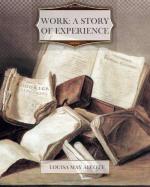She and Mr. Power held Christie up through that hard time, ministering to soul and body with their hope and faith till life grew possible again, and from the dust of a great affliction rose the sustaining power she had sought so long.
As spring came on, and victory after victory proclaimed that the war was drawing to an end, Christie’s sad resignation was broken, by gusts of grief so stormy, so inconsolable, that those about her trembled for her life. It was so hard to see the regiments come home proudly bearing the torn battle-flags, weary, wounded, but victorious, to be rapturously welcomed, thanked, and honored by the grateful country they had served so well; to see all this and think of David in his grave unknown, unrewarded, and forgotten by all but a faithful few.
“I used to dream of a time like this, to hope and plan for it, and cheer myself with the assurance that, after all our hard work, our long separation, and the dangers we had faced, David would get some honor, receive some reward, at least be kept for me to love and serve and live with for a little while. But these men who have merely saved a banner, led a charge, or lost an arm, get all the glory, while he gave his life so nobly; yet few know it, no one thanked him, and I am left desolate when so many useless ones might have been taken in his place. Oh, it is not just! I cannot forgive God for robbing him of all his honors, and me of all my happiness.”
So lamented Christie with the rebellious protest of a strong nature learning submission through the stern discipline of grief. In vain Mr. Power told her that David had received a better reward than any human hand could give him, in the gratitude of many women, the respect of many men. That to do bravely the daily duties of an upright life was more heroic in God’s sight, than to achieve in an enthusiastic moment a single deed that won the world’s applause; and that the seeming incompleteness of his life was beautifully rounded by the act that caused his death, although no eulogy recorded it, no song embalmed it, and few knew it but those he saved, those he loved, and the Great Commander who promoted him to the higher rank he had won.
Christie could not be content with this invisible, intangible recompense for her hero: she wanted to see, to know beyond a doubt, that justice had been done; and beat herself against the barrier that baffles bereaved humanity till impatient despair was wearied out, and passionate heart gave up the struggle.
Then, when no help seemed possible, she found it where she least expected it, in herself. Searching for religion, she had found love: now seeking to follow love she found religion. The desire for it had never left her, and, while serving others, she was earning this reward; for when her life seemed to lie in ashes, from their midst, this slender spire of flame, purifying while it burned, rose trembling toward heaven; showing her how great sacrifices turn to greater compensations; giving her light, warmth, and consolation, and teaching her the lesson all must learn.




